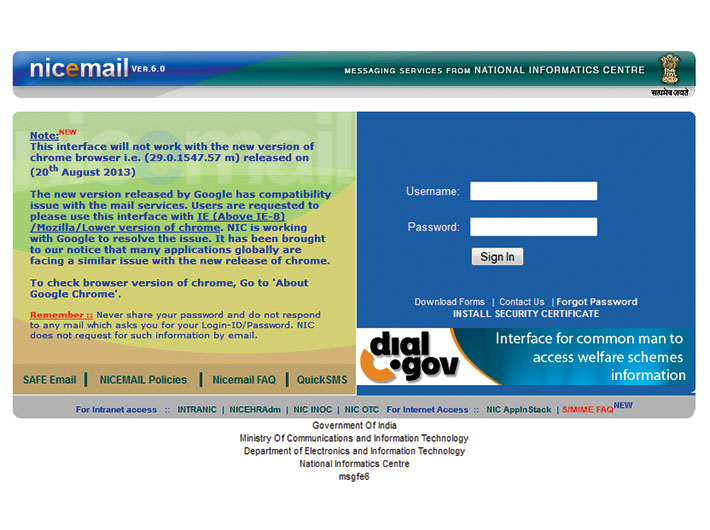Gmail or Yahoo may be easy to use and have more features but the government wants safety and security to be paramount
No more Gmail for government officers. Edward Snowden’s revelations about the snooping activities of the US has got the Indian government worried enough to ask its officers to stop using public email services and use only the service provided by the government-run National Informatics Centre (NIC).
Though public email services are easy to use and provide a lot of space, their servers are not in India and most are located in the US.
NIC’s mail servers are in India and under the government’s control. Location, however, is not the only consideration. Recently, NIC servers moved from Windows to an open-source environment, Arul Kumaran, scientist ‘B’ at NIC, told Governance Now. “Open source provides better security architecture. We have also shifted to blade servers in Java environment,” he added.
Other security features have also been upgraded. Firewalls are now stronger, secure log-ins have an additional encrypted password authentication layer which ensures that only the right person logs in, security socket layer (SSL) protocols are beefier to make sure that emails are not intercepted and idle sessions log off after 15 minutes. All these measures ensure that confidential government business stays that way.
But the beefed up NICmail has very few takers. The main reason is the lack of features in the mail, something that popular public email services provide in abundance. PK Agarwal, director, IT, Tripura, said Gmail offers a level of ease that’s not available with NICmail. “There is a marked difference in user experience in Gmail; mails are present as conversations which make them easily searchable. Attachments up to 10 MB can be sent without any problems,” he said. “We receive a large number of mails every day and Gmail provides 10 GB of free space.”
Governance Now also found that many senior officers had listed their Gmail id's in place of their official email id's on departmental websites. CSR Prabhu, Deputy Director General (DDG), NIC, was to quick refute it. “We have millions of subscribers who actively use it at work. Most government officers, like everybody else today, have their personal email id's but all of them predominantly use the NIC mail,” he asserted.
A lot of government officers also want to continue using Gmail because they feel it would be cumbersome to move their work-related communication and documents from one platform to another. “It is convenient and since people are used to one kind of email experience, they do not want to switch to the other,” said Utpal Sharma, special secretary, IT, Andaman and Nicobar Islands.
Jeevesh Nandan, secretary, IT, Uttar Pradesh, agreed that there were definite advantages to using Gmail, but added, “We will comply with the government orders and switch to the NICmail whenever the notification is issued.”
Kumaran contends that NICmail is not as featureless as it is made out to be. Though it may not have custom backgrounds, there are plans to build a chat interface. Kumaran said the revised version of the mail, now available on mail.gov.in, provides an unlimited capacity for storage unlike public email services. The attachment limit is 1 GB, much higher than Gmail’s 10 MB. “We also provide an anti-virus and anti-spam filter in the NIC email server which allows a smooth working experience for the user,” said Kumaran.
The government, however, still hasn’t figured out how to make the NICmail accessible over smartphones, especially BlackBerry that a lot of senior officers use. The protocols of enterprise servers clash with the security norms of the government. “As of now there are no plans to integrate the same,” said Kumaran. So that makes NICmail a secure desktop-only email service.
The extent of the US surveillance has shaken the government enough to ban private email clients in offices. One senior officer, on condition of anonymity, said such decisions “come and go”. But this time it seems different with the government looking determined to secure all its electronic doors and windows.
While the debate about whether NICmail can compete with Gmail will go on, the question that comes to mind is why NIC took so long to come up with its
own mail.

